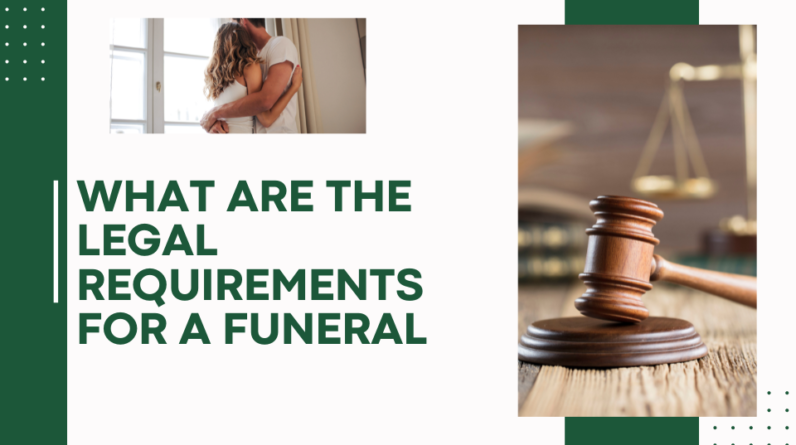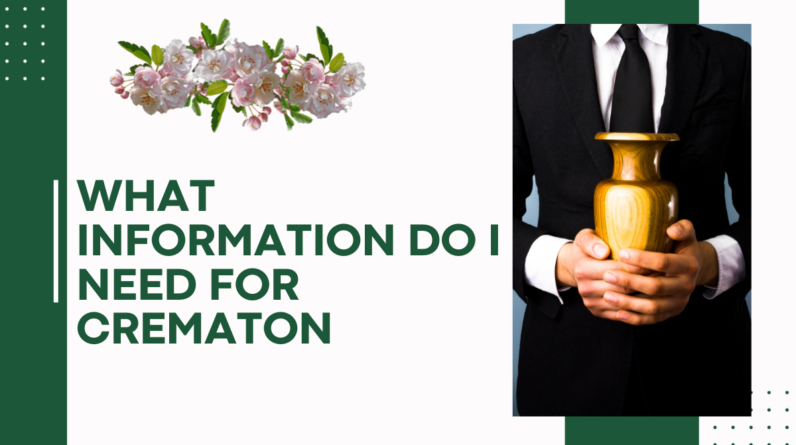
Discover the legal requirements for funeral arrangements in Orlando. From licenses and permits to preparation and burial, ensure compliance during this difficult time.
Planning a funeral can be a daunting task, especially when you consider the various legal requirements involved. If you find yourself in Orlando and need to make funeral arrangements, it’s crucial to familiarize yourself with the legal obligations to ensure a smooth process during such a difficult time. From obtaining a burial permit to understanding the regulations regarding cremation, this article provides a concise overview of the legal requirements for funeral arrangements in Orlando. Whether you’re a grieving loved one or a future funeral planner, this information will help ensure compliance with the necessary legalities while honoring the memory of your loved one.

Legal Requirements for Funeral Arrangements in Orlando
Planning a funeral can be a daunting task, especially when it comes to navigating the legal requirements involved. Whether you are pre-planning a funeral or arranging one after the passing of a loved one, it is important to understand the legal obligations and permits necessary to ensure a smooth and compliant process. In this guide, we will provide you with a comprehensive overview of the legal requirements for funeral arrangements in Orlando, so you can make informed decisions during this difficult time.
Licenses and Permits
Before proceeding with any funeral arrangements, it is crucial to ensure that the funeral home and directors involved have the proper licenses and permits in place. This ensures that the services provided meet the legal standards and regulations set forth by the State of Florida. Here are the key licenses and permits you need to be aware of:
Funeral Establishment License
The funeral home or establishment you choose must hold a valid funeral establishment license issued by the State of Florida. This license ensures that the establishment meets the necessary requirements to conduct funeral services and handle human remains.
Funeral Director License
In addition to the establishment license, each funeral director involved in the arrangements must hold an individual funeral director license. This license is granted to individuals who have completed the required education, training, and examinations to practice as a funeral director in the state.
Cemetery and Crematory Licenses
If you choose burial or cremation as the method of disposition, it is essential to confirm that the cemetery or crematory you select has the appropriate licenses. These licenses demonstrate that the facility complies with the regulatory standards for handling human remains and ensures that your loved one will be laid to rest in a legally designated place.
Zoning Permits
Depending on the location in Orlando where the funeral home is situated, it may also be necessary for the establishment to obtain zoning permits. These permits ensure that the funeral home operates in compliance with local zoning ordinances and that the location is suitable for funeral services.
Preparation and Disposition
The preparation and disposition of the deceased are crucial aspects of the funeral arrangement process. It involves preparing the body for burial or cremation, as well as making decisions on viewing and funeral ceremonies. Here are the key considerations:
Embalming Authorization
Embalming is the process of preserving the body through the use of chemicals and treatments. In Orlando, embalming is generally not required unless the deceased died of a contagious disease or if the body will be transported out of state. However, it is important to check with the funeral home and understand their specific policies regarding embalming.
Alternative Methods of Preparation
If embalming is not performed, alternative methods of preparation may be utilized. These methods can include refrigeration or the use of non-chemical preservation techniques. It is essential to discuss these options with the funeral home to ensure the proper care of the deceased.
Transfer of Remains
If the deceased will be transported to a different location for burial or cremation, it is necessary to arrange for the transfer of remains. This involves coordinating logistics with the funeral home, transportation companies, and any other parties involved. The funeral home can guide you through the necessary steps and provide assistance in making these arrangements.
Donating Body to Science
For individuals considering donating their body for medical research or education purposes, there are specific guidelines and procedures to follow. It is important to contact a reputable anatomical donation organization or medical school to understand their requirements and ensure proper documentation in advance.
Body Viewing and Funeral Ceremony
Planning a viewing or funeral ceremony is an essential part of the grieving process for many families. It is important to discuss your preferences with the funeral home to ensure that arrangements are made for the viewing and ceremony that align with your wishes and adhere to any legal requirements.
Embalming
Embalming is a significant aspect of funeral preparation and preservation of the deceased. Although it is not always required, understanding the purpose, requirements, and alternatives can help you make informed decisions. Here is what you need to know about embalming:
Definition and Purpose
Embalming is the process of treating the body to slow down the natural decomposition process, allowing for a more extended viewing period and preservation of the deceased. It involves the use of chemical solutions that disinfect and temporarily preserve the body. The primary purpose of embalming is to enhance the presentation of the deceased for viewing and provide a dignified farewell.
When Embalming is Required
In most cases, embalming is not required by law in Orlando. However, there are exceptions when embalming may be necessary, such as when the deceased died of a contagious disease or if the body needs to be transported out of state. It is essential to check with the funeral home and understand their specific policy on embalming.
Exceptions and Alternatives
If you choose not to embalm the body, there are alternatives available. Refrigeration can effectively preserve the body for a limited time, allowing for viewing and funeral ceremonies to take place. Some funeral homes also offer non-chemical preservation methods, such as dry ice or specialized refrigeration units, as alternatives to embalming.
Disclosures and Consent
If you opt for embalming, the funeral home is required to obtain your consent before proceeding. They should provide you with detailed information about the embalming process, including any potential risks or side effects. It is important to read and understand the disclosures provided and ask any questions to ensure you are making an informed decision.
Cremation
Cremation has become an increasingly popular choice for final disposition in Orlando and across the country. If you are considering cremation, understanding the legal requirements and procedures is essential. Here is what you need to know:
Cremation Authorization
Before a cremation can take place, the funeral home must obtain authorization from the legal next of kin or an authorized representative. This authorization is typically granted through a signed document or a cremation authorization form. It is essential to ensure that the individual granting authorization has the legal right to do so.
Crematory Requirements
Crematories in Orlando must adhere to specific regulations and guidelines to ensure the proper handling of human remains. These requirements include the use of state-of-the-art equipment, identification procedures, and proper record-keeping practices. Before choosing a crematory, it is advisable to inquire about their compliance with these standards.
Scattering and Storage of Ashes
Once the cremation process is complete, you have several options for the final disposition of the ashes. While scattering the ashes in a meaningful location or keeping them at home in an urn are common choices, it is important to understand local laws and regulations regarding scattering on public or private property. Some locations require permission or have specific guidelines for scattering.
Cremation Certification
After the cremation process, the funeral home will provide you with a cremation certificate. This document serves as official proof that the cremation has been completed. It is recommended to keep this certificate in a safe place for future reference and any necessary legal or administrative purposes.
Burial
Burial remains a traditional and widely chosen method of final disposition. Whether you opt for a burial in a cemetery or on private property, it is important to understand the legal requirements and considerations. Here is what you should know:
Choosing a Cemetery
The first step in arranging a burial is selecting a cemetery. In Orlando, there are several public and private cemeteries to choose from, each with its own rules, regulations, and costs. It is essential to visit the cemetery, review their guidelines, and inquire about any specific requirements they may have for burial plots.
Burial Plot Purchase or Rental
To secure a burial plot, you can choose to purchase or rent it, depending on the cemetery’s policies and your preferences. Purchasing a plot typically grants perpetual ownership, while renting allows for temporary use of the plot. It is important to review the terms and conditions regarding ownership or rental agreements to ensure compliance with the cemetery’s policies.
Grave Opening and Closing
When it is time for the burial, the funeral home will coordinate with the cemetery to open and close the grave. This process involves excavating the ground, inserting a burial vault or liner (if required), and properly sealing the grave. The funeral home will handle the logistics and ensure that the burial is conducted with dignity and respect.
Casket and Vault Requirements
Most cemeteries have specific requirements regarding the type, material, and dimensions of caskets and burial vaults allowed. These requirements ensure that the burial is conducted in an environmentally responsible manner and maintain the integrity of the gravesite. The funeral home can provide guidance on selecting a casket and burial vault that meet the cemetery’s requirements.
Headstones and Grave Markers
After the burial, it is customary to mark the gravesite with a headstone or grave marker. The design, material, and size of these markers are typically regulated by the cemetery. It is essential to review the cemetery’s guidelines and work with a reputable monument company to create a fitting memorial that complies with the regulations.
Transportation
Transporting the deceased is an important aspect of funeral arrangements, whether within Orlando or to another location. Here are the considerations and requirements regarding transportation:
Transporting the Deceased Within Orlando
If you need to transport the deceased within Orlando, the funeral home will take care of the necessary arrangements. They will ensure that the body is transferred safely and securely between locations in compliance with all regulations and guidelines.
Transporting the Deceased Outside Orlando
If you require transportation of the deceased to a location outside of Orlando, additional requirements and documentation may be necessary. This can include obtaining a transit permit or coordinating with transportation companies specializing in repatriation services. The funeral home can assist you in making these arrangements and ensuring all legal obligations are met.
Transportation of Cremated Remains
For the transportation of cremated remains, it is important to follow the guidelines set by the Transportation Security Administration (TSA) and the Federal Aviation Administration (FAA). It is often recommended to carry the cremated remains as carry-on luggage in a sturdy container that meets the TSA’s guidelines. It is advisable to contact the airline beforehand to understand their specific requirements and any necessary documentation.
Transportation Permit Requirements
Depending on the circumstances surrounding transportation, permits may be required. This can include transit permits for transporting the deceased across state lines or international permits for repatriation. The funeral home will be able to guide you through the permit requirements and assist in obtaining the necessary documentation.
Death Certificates
Obtaining a death certificate is a crucial step in the funeral arrangement process. It serves as an official record of the individual’s passing and is necessary for various legal and administrative purposes. Here is what you need to know:
Obtaining a Death Certificate
To obtain a death certificate in Orlando, you must request it from the Office of Vital Statistics. The funeral home can assist you in completing the necessary paperwork and guide you through the process. It is important to provide accurate information and any supporting documentation required to ensure timely issuance of the death certificate.
Filing the Death Certificate
Once the funeral home completes the death certificate, it must be filed with the Office of Vital Statistics within a specified timeframe. The funeral director typically handles this task, ensuring that all required information is recorded accurately.
Amending a Death Certificate
In certain circumstances, it may be necessary to amend a death certificate. This can include correcting errors or updating information that was initially recorded incorrectly. The funeral home can advise you on the necessary steps to take and assist in the process of amending the death certificate, if required.
Multiple Certified Copies
It is advisable to obtain multiple certified copies of the death certificate. These copies are often required for various purposes, such as settling the deceased’s estate, claiming life insurance benefits, or updating official records. The funeral home can assist you in determining the number of copies needed and arrange for their issuance.
Funeral Directors and Establishments
Choosing a reputable funeral director and establishment is crucial for ensuring a smooth and professional funeral arrangement experience. Here are the considerations and requirements to keep in mind:
Qualifications and Licensing
Funeral directors in Orlando must meet specific qualifications and hold a valid funeral director license. These licenses ensure that the individual has completed the required education, training, and examinations to practice as a funeral director in the state. It is important to inquire about the funeral director’s qualifications and ensure they are licensed before engaging their services.
Funeral Home Requirements
Funeral homes in Orlando must meet certain requirements to obtain and maintain their licenses. These requirements encompass facility standards, equipment maintenance, record-keeping practices, and compliance with all applicable laws and regulations. Before selecting a funeral home, it is advisable to visit the facility, ask for references, and verify their credentials.
Advertising and Pricing
Funeral homes in Orlando must adhere to specific guidelines when it comes to advertising their services and pricing. They must provide transparent and accurate information about their offerings and clearly disclose all costs associated with the funeral arrangements. It is essential to review the funeral home’s pricing policies and ensure that they align with your budget and expectations.
Contract and Legal Obligations
When engaging a funeral home for funeral arrangements, it is essential to sign a contract that outlines the services provided, associated costs, and any other relevant terms and conditions. It is important to read the contract carefully, ask any questions, and ensure that you understand all the legal obligations and rights involved.
Veterans’ Benefits
For those who have served in the military, there are specific benefits and honors available to honor their service during the funeral arrangements. Here is what you need to know:
Honoring Military Service
Veterans are entitled to certain honors and traditions as a tribute to their military service. This can include the folding and presentation of the United States flag, the playing of Taps, and the presence of a honor guard. The funeral home can coordinate these honors and work with the appropriate military representatives to ensure a dignified tribute.
Burial in a National Cemetery
Eligible veterans may be buried in a national cemetery or receive burial benefits, including a gravesite, opening and closing of the grave, and a government-furnished headstone or marker. It is important to contact the National Cemetery Administration to understand the eligibility requirements and availability of burial options.
Financial Assistance
Veterans’ families may be eligible for financial assistance to cover funeral and burial costs. The amount of financial assistance available depends on factors such as the deceased’s military service, discharge status, and eligibility for other benefits. To explore these options, it is advisable to contact the U.S. Department of Veterans Affairs (VA) or consult with a funeral director who specializes in veterans’ benefits.
Military Funeral Honors
Military funeral honors are a way to pay tribute to veterans and their families during the funeral service. This includes the rendering of military salutes, the playing of Taps, and the presentation of the United States flag to the next of kin. The funeral home can help coordinate military funeral honors and ensure that all necessary arrangements are made with the appropriate military authorities.
Planning a funeral is never easy, but understanding the legal requirements can help simplify the process and ensure compliance with all necessary regulations. By familiarizing yourself with the licenses and permits, preparation and disposition options, embalming and cremation requirements, burial regulations, transportation considerations, death certificate procedures, funeral director and establishment guidelines, and veterans’ benefits available, you can navigate the funeral arrangement process in Orlando with confidence and peace of mind.







